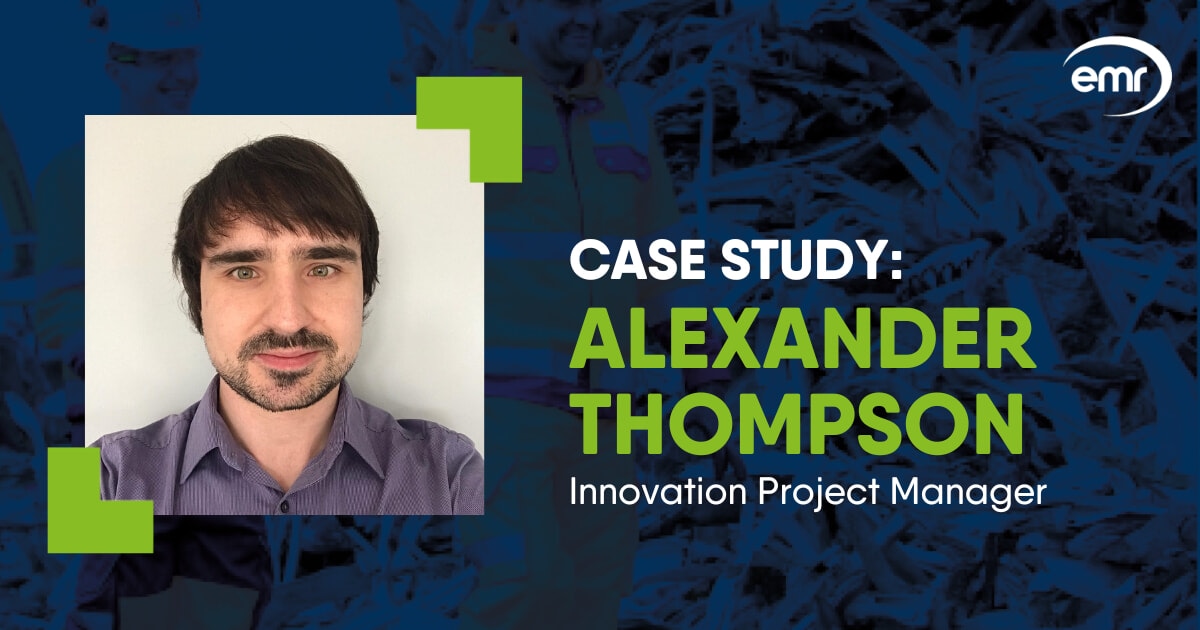CHOOSE
A DIFFERENT TERRITORY

In a dynamic recycling market, Innovation Project Manager Alexander Thompson helps to find and develop new ways for EMR to thrive.
“My role is about analysing the industry and identifying new opportunities for our customers to use the sustainable materials we produce at our sites,” says Alexander. “I was originally brought in to oversee the RECOVAS project, which aims to create a brand-new supply chain for recycling or repurposing the high-performance batteries in end-of-life electric vehicles (EVs).”
Alongside EMR, the RECOVAS consortium includes car manufacturers Jaguar Land Rover, Bentley, and BMW; energy and engineering firms Connected Energy and Autocraft Solutions, as well as academics from the University of Warwick. It's supported by the UK Battery Innovation Centre (UKBIC), the Health & Safety Executive and was brought together with funding from the Advanced Propulsion Centre.
“Since then, I developed the RECTIFI project – a partnership between EMR, TATA Steel, Aggregate Industries, and waste management firm Darlow Lloyd & Sons – which aims to reduce CO2 emissions in the carbon-intensive steel and concrete sectors. Most recently, I helped establish EMR’s Re-Rewind partnership, which is developing new and exciting ways to recycle decommissioned wind turbines.”
A substantial element of managing these technically advanced collaborative projects is building relationships between companies within each supply chain.
“Major manufacturers across all sectors and industries have become increasingly aware of the importance of their supply chains, as well as what their net-zero commitments mean in practice,” Alexander says.
Many businesses – including EMR – aim to become fully net-zero by 2040. This requires companies to reduce emissions in their own operations (Scope 1) as well as those created up and down their supply chains (Scope 2 and Scope 3).
“This means businesses must ensure that their suppliers and customers are aligned with their overall net-zero strategy, and that’s where EMR can help,” explains Alexander. “Projects such as RECOVAS, RECTIFI and Re-Rewind are allowing our teams to recycle or repurpose more material and then deliver high-quality sustainable metals and plastics back to mills and manufacturers as part of a circular supply chain.”
With up to 50% of the value of an end-of-life EV (Electric Vehicle) expected to come from its battery, Alexander’s work is also helping to safeguard the future of EMR in the decades ahead.
“Thanks to RECOVAS, EMR has gained significantly more knowledge and experience about battery recycling. That’s helped us commit to building large scale facilities, which will be essential to building a sustainable and circular economy for EV batteries in the UK. It will also be a major boost to this country’s resource security.”
Alexander’s career began after studying Mechanical Engineering at Brunel University. From there, his journey has included working as an Engineering Project Manager for Far UK, which designs and manufactures lightweight structural composite components for high-performance vehicles. He also worked onsite at Jaguar Land Rover as Development and Innovation Engineer at Sika, working on early-stage technologies including the introduction of lighter components to improve the fuel efficiency of new vehicles.
These experiences eventually led to Alexander joining the EMR team in early 2021 and, with his focus on EV battery recycling and the RECOVAS partnership, he believes he’s now found his calling:
“Over the next few years EMR is going to have to be very agile in this rapidly-changing market,” Alexander says. “For example, the emergence of new EV manufacturers and changes to the chemistry of batteries in the future could have an impact on either disassembly or our overall material flow. Maintaining great service and continuing to deliver high-quality sustainable materials will therefore mean investing in a range of advanced technologies that allow EMR to remain market leaders. Being a part of this transition is both exciting and very rewarding.”